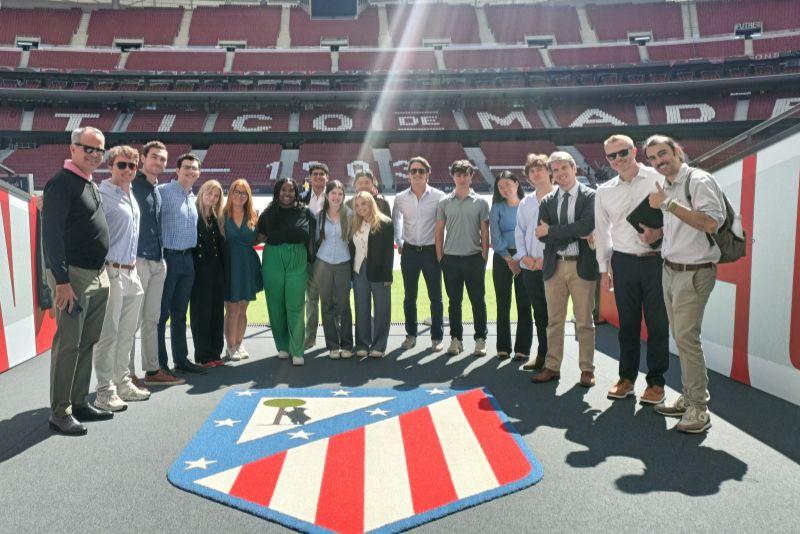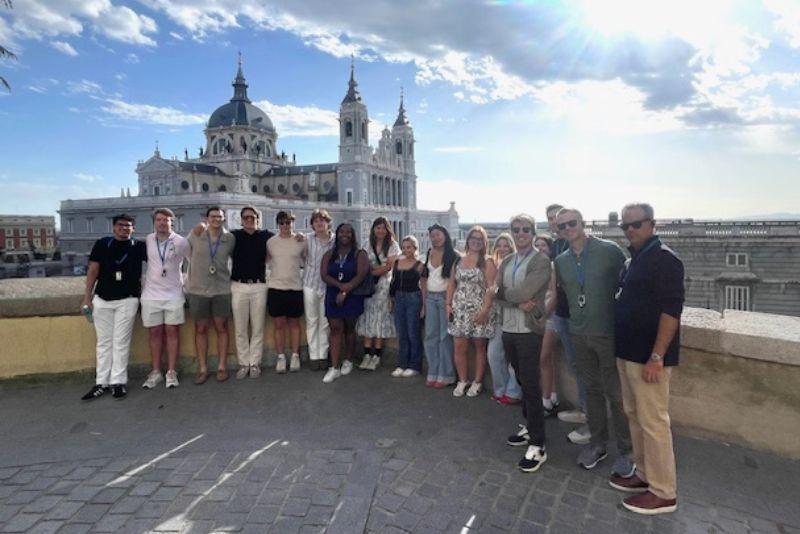Freeman students make Madrid their classroom

Students in Freeman’s Hospitality, Sports Management, and Real Estate Finance Certificate programs traveled to Madrid in May to gain global business insights and explore the culture and economy of one of Europe’s top destinations.
The weeklong trip was part of the new Global Immersion Summer Abroad Program, and included site visits, meetings with local entrepreneurs and presentations by industry leaders. The trip culminated with an immersive experiential learning project in which students acted as consultants for Madrid-based firms.
“The hospitality, sports management and real estate finance industries don’t stop at U.S. borders,” said Myke Yest, associate dean of undergraduate education at the Freeman School. “We want our students to have business experience in an international context, and the Global Immersion Program gives them a chance to develop business strategies that work across cultural lines.”
With its booming hospitality, sports and real estate sectors, Madrid proved an ideal program location. Yest noted the city’s iconic Atlético de Madrid soccer stadium was a valuable case-study for exploring the relationship between these industries.
“The hospitality, sports, and real estate industries coalesce in Madrid’s soccer stadium,” he said. “The stadium is a sports management venue, but it’s also a hospitality venue for fans who come to watch the matches and a real estate venue for sponsors.”
For Macy Granger (BSM ’26), touring the Atlético de Madrid stadium and the headquarters of LaLiga, Spain’s top professional soccer league, was a highlight.
“My favorite part of the trip was the incredible site visits,” said Granger. “A significant portion of the LaLiga’s non-game-day revenue comes from pre-game and post-game activations, as well as hosted events. I enjoyed learning how the team markets beyond the game itself, using the stadium as a platform to create value.”
In addition to surveying Madrid’s economy, students got a taste of Spanish culture by exploring historic neighborhoods, sampling local cuisine at food markets and navigating the city’s public transportation system.
To cap off the trip, students partnered with Madrid companies to address a real-world business challenge, delivering a 30-minute presentation at the end of the week.
Sports Management students worked with World Football Summit, an international sports event planner developing a US expansion plan for the 2026 FIFA World Cup.
“In our presentation, we explained that World Football Summit’s current business model would face challenges,” Granger said. “To better align with the U.S. sports landscape, we recommended World Football Summit partner with city-based sports foundations and place greater emphasis on sponsorships.”

Meanwhile, the real estate finance team partnered with Pauli.Ai, a property technology company looking to use artificial intelligence to simplify real estate renovation work.
“This project challenged me in multiple ways, especially since most Freeman real estate classes don’t involve AI or renovation,” said Katherine Yu (BSM ’26). “But the Pauli.Ai founders were so open to hearing our ideas for helping homeowners make smarter, more efficient renovations.”
As part of the hospitality team, Jackson Smith (BSM ’26) worked with Arktos Brewery to develop a new marketing and pricing strategy.
“To really understand Arktos’ growth challenges, we spoke with their head of operations, toured their taproom and analyzed their customer base,” Smith said. “In the end, we delivered a comprehensive marketing and pricing model that the company leaders were receptive to.”
Diego Bufquin, professor of practice in management and director of the undergraduate Hospitality Certificate Program, said that part of the challenge for students was working within time constraints to deliver effective solutions.
“I was truly impressed by the students' presentations,” Bufquin said. “Given the limited time they had, the depth of their research and the quality of their insights was impressive.”

Jeff Salyers, professor of practice in marketing, noted that the consulting projects not only gave students hands-on business experience but encouraged them to reflect on the ways culture shapes business practices.
“International experiences open students’ eyes to the way business functions around the globe,” he said. “Students gain a more global perspective, which allows them to be curious about new cultures. Ultimately, they come away from a trip like this better prepared for international business engagements they will likely encounter throughout their careers.”
After its successful debut in Madrid, the Global Immersion Summer Abroad Program is set to continue next summer in Barcelona, where a new group of students will have the chance to explore global business in another of Europe’s most exciting cities.
Discover the exciting opportunities with Freeman’s undergraduate programs. Learn more about all undergraduate majors, minors and certificates offered.
Other Related Articles
- Students network their way through Manhattan in annual Real Estate Trek
- Alum brings rugby mindset to new consulting program
- AI-powered fund takes top prize in Aaron Selber Jr. Hedge Fund Course
- Keeping it cool: MBAs help Convention Center find its temperature sweet spot
- Investopedia: Rising Inflation and Slowing Growth Are Investors' Worst Nightmare
- Alum shares playbook on forensic accounting
- New minor for non-business students to launch
- Research Notes: Diego Bufquin
